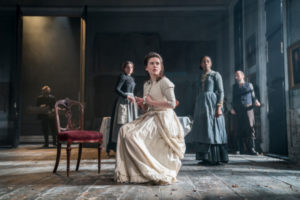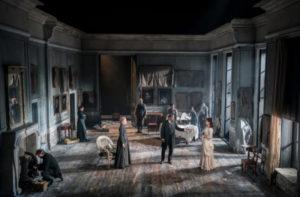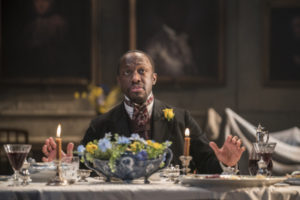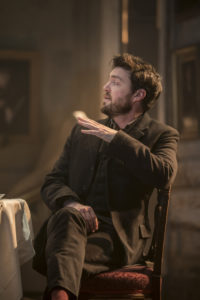The greatest play of the 20th century with our greatest actor
★★★★★
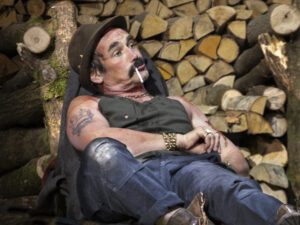
I’ve now seen the play that I probably anticipated more than any other in my life. And it exceeded my expectations. Jerusalem is the greatest 21st century play I’ve seen, and Mark Rylance‘s performance is as good as any.
Jez Butterworth’s play is set during St George’s Day, a day when John Byron and his dilapidated mobile home face eviction from his illegal campsite in a Wiltshire wood, the annual local fate stirs memories, his enemies gather, and friendships are tested. In the course of the three-hour play, we’re presented with a picture of an underclass whom society can’t accommodate and wants to pretend doesn’t exist.
It’s a kind of state of the nation play and that nation is seen as controlled and anodyne with its freedom squashed. A mythical past is evoked and the present found wanting. It helps that Mark Rylance’s character is a complex mixture
of light and dark, mischief and malevolence, but Mark Rylance so thoroughly inhabits the role, physically as well as verbally, that you forget he’s acting.
Before the curtain even goes up, we are given hints as to what to expect and what we can expect is going to be complex. The curtain is a huge St George cross faded and of course full of contradictory associations. It may be the England flag but it’s so often associated with a kind of xenophobic little Englander that we’re bound to wonder what’s in store, especially if we consider (and we are reminded later) that St George never even set foot in England.
Although it’s set during St George’s Day, it’s not looking back to Shakespeare, whose birthday is traditionally celebrated on that day, or indeed to the poet Byron who shares his name with the main protagonist. And it’s certainly not about the past colonialists and industrialists who made this nation rich.
A young woman dressed as a fairy, possibly a flower fairy, walks onto the stage in front of the flag and sings Jerusalem. The immortal opening lines hang in the air: ‘And did those feet in ancient time walk upon England’s mountains green.’ They didn’t, of course, but it’s a prelude to a play that has a lot to say about English myths. As she’s finishing, there’s a jolting shock of very loud dance music playing. The curtain goes up on a night time scene in a wood where there’s a rundown mobile home and lots of people having a rave.
The set designed by ULTZ is made up of real English oak trees and it looks like a real mobile home or trailer, as Americans would call it. Despite the mess, you feel you’re in the land of Robin Hood and A Midsummer Night’s Dream, something that should be conserved. Everything is going to happen on this set in the course of this one day in this tight perfectly
constructed play.
Incidentally, it’s the same set design as the original production. ULTZ is just one of the entire creative team that’s been
reassembled, the rest being director Ian Rickson, the lighting designer Mimi Jordan Sherin and the sound designer Ian Dickinson.
So, the scene’s been set for the exploration of a jaded present and a mythical past, gatherings that will reveal the characters, and the girl
that will be the downfall of Rooster Byron.
Then it’s dawn and the site is deserted. The messy state of this clearing in the woods is now clear. Two Council officers played by Niky Wardley and Shane David-Joseph arrive and, at precisely nine o’clock, serve an eviction notice on Rooster because he’s annoying his new neighbours on the recently built estate on the edge of this Wiltshire wood. We also learn later that the Council may be planning to build on this woodland, which may be why it’s taken them 27 years to come up with an eviction order. Their mechanical jobsworth approach is amusing but also inhuman. When they leave, we get our first proper sight of Rooster John Byron.
Straightaway we’re made to sit up in our seats, as he clears his head by doing
handstand in a trough of water and then propels himself out of the trough and onto his feet. It’s the physical act of a gymnast, impressive for an actor in his 60s or indeed any age, and we may realise that, although he’s something of a slob, he’s a fit slob.
He then proceeds to spray the audience with liquid and throw eggshells at them. Well, that’s one way to get attention. Mark Rylance gives a tremendously physical performance as the free-spirited traveller. He walks with the puffed chest of a cockerel. Is that how he got his nickname? But he does have a limp and we find out later that he was injured when pursuing a career(if that’s the right word) as a daredevil motorcycle rider. This previous near fatal job is indicative of one aspect of his character- that he’s brave to the point of foolhardiness.
That’s why we admire him despite ourselves because he’s not only brave but he’s true to himself. He could certainly move but he defiantly refuses. He’ll not conform to society’s norms and expectations. We wouldn’t want him as our neighbour with his drug dealing, loud parties, and entertaining teenagers, but while his backyard is on that theatre stage, we’re on his side.
The other characters we meet only underline his character. The people who gather around him our society’s misfits and rejects. Now, Rooster may be both of these things but he actively chooses his life. He’s a rebel in an age of conformity. Part of his group are people he’s known all his life and it’s a magical element of this show that all the actors of those roles in the original production
are back. It’s as if Mark Rylance has said ‘I’m getting the band back together for one more gig.’
Mackenzie Crook is Ginger, the person closest to Rooster. He’s an unemployed plasterer and would-be DJ. Literal-minded, he lacks imagination but he does have a sense of humour, and he seems to live for his time with Rooster. He’s also shown to be a coward on more than one occasion. Such a contrast to Rooster who has flights of fantasy, sees a much bigger picture,
and doesn’t actually seem to be too bothered about who he’s with.
Mackenzie Crook is a joy to watch as he displays on his face the limits of his brain . He’s a lost soul and he looks it. When he first arrives, he’s full of excitement about the annual Flintock Fair. The fair runs as a motif throughout the play. He loves it because it’s part of tradition, but, like so much else, it’s a faded replica of what it once was. Ginger tells us: ‘When I was a boy, there was this big farmer and you paid 10 pence to take a run up and hoof him in the bollocks. What have they got now?’ he asks. ‘Throw a sponge at the lady vicar’ is the response. We also learn that Johnny’s daredevil rider act used to be the highlight of the show until he had his accident and Health and Safety stepped in to end his career. The fair can often be heard in the background.
Ginger’s annoyed at missing the previous night’s party but Rooster tries to tell
him there was no party and launches into the first
of many tall stories that display his imagination and gift of the gab. He was, he says, visited by the Spice Girls for a night of debauchery and, just to say here, that Mark Rylance is as good a verbal as physical actor. The voice he employs is that of someone stoned: slightly deliberate, slightly hesitant, and slightly very slightly slurred.
Alan David is again The Professor, another misfit and struck it seems by dementia. He has knowledge but can’t apply it. Gerard Horan is Wesley, the
pub landlord who publicly bans Rooster for his outrageous activities but is actually an old acquaintance. He does what he has to do but lets his wife Sue run the pub. He’s been forced by the brewery to dress up as a Morris Man for the annual fair but as the day goes on he becomes wasted and his white outfit stained and dirty. He reminisces with Rooster about their days as young men,
boys actually, getting their first experience of sex. His life now is clearly much less free. Rooster on the other hand never seems to long for the past because it’s inside him, and he feels free. He observes the others with a wry smile and occasional exasperation.
Young people are also attracted to Johnny’s campsite. Lee, played by Jack Riddiford with a ready smile, is fed up with his life in Flintock and intends to
leave for Australia the next day, but typically he has no plan beyond that. Davey, played by Ed Kear with an amusing offhand delivery, has a literally dead-end job- he slaughters cows at an abattoir all day. He’s no ambition to leave Wiltshire. In fact he’s positively hostile to the idea: ‘I leave Wiltshire, my ears pop,’ he says. He and the others are part of an underclass
unnoticed and unheard by the political elites.
Two girls appear. Pea and Tanya, played by Kemi Awoderu and Charlotte O’Leary, are barely sixteen. They mention their fifteen-year-old friend Phaedra Cox, the reigning May Queen, who’s gone missing. At the end of act one, we hear in the distance the PA announcing the opening of the fair.
Act two begins, again we see the fairy whom we now think is probably Phaedra, singing The Werewolf, a song about someone who ‘can’t help’ attacking young maidens.
It’s now afternoon. ‘Outcasts, leeches and undesirables,’ says Johnny about his
companions. They discuss how the beginning of May is a traditional time for misrule. Johnny is in his element. He fantasises about leading a Flintock rebellion that will go down in history, and he tells yet another story.
While the others have vague recollections of a better more interesting England in both recent and ancient times, Johnny the traveller seems to be the only one who recognises the power of the myth, and he goes about creating
some of his own.
In a play about myths, Mark Rylance is a legend
They’re all amusing but this is possibly the funniest. It’s about the time he me a hundred foot giant who’d walked from Land’s End. The giant tells him he built Stonehenge, although Johnny says that could be bullshit. They mainly talk about the weather. Then there’s a hilarious moment when Johnny puts his disposable lighter onto the ground to represent himself and takes on the role of the giant leaning down and stroking him. The giant gives Johnny a drum which was his earring and says he can use it to summon the giants.
Ginger takes him up on this asking why BBC Points West didn’t report a giant
striding across their patch. This leads to a lament about the way Points West has expanded its region so much that it’s no longer local. Davey thinks
they might have missed the story because there’s so much to report. He tells how he was upset by a story about an old lady being kicked to death, ‘before I realise it’s some old biddy from Wales, how could i possibly care less?’ he concludes. And this is what happens throughout Jez Butterworth‘s brilliant
play. He gives little examples and hints about the way things are not how they used to be, and asks whether we want to exchange freedom of speech and action for an obedient, safe society: the anonymous estate versus the individual, supermarket products versus the wild garlic in the wood (surely a metaphor for Rooster), a homogenous nation versus a tribal one, conformity
versus the free spirit, safety versus risk, rootlessness against Rooster’s rare bloodline.
The complexity of the content and of Rooster himself is what makes this play so great. It shows again and again that England’s past is a myth but
do the myths sustain the English or hold us back?
Ginger skeptically asks: ‘where is the drum?’ ‘You’re sitting on it,’ says Johnny, and, sure enough, under a cloth is an ornate drum. So the drum, which will feature at the end is cleverly and humorously introduced.
We’re halfway through the play now and it’s time to meet Johnny’s ex-partner Dawn and his son. The boy is clearly uncertain about this strange man who was supposed to be taking him to the fair but now can’t because of the pressing matter of the eviction. Dawn played by Indra Ove still cares about Johnny but has chosen a more conventional life.
The act ends with the arrival of Troy looking for his stepdaughter Phaedra. He suspects Rooster knows where she is. Troy is another acquaintance from way back and is played by the final member of the original cast, Barry Sloane. With a boxer’s stance, he’s incredibly sinister. His threat to Johnny is chilling. Johnny remains affable but he’s clearly worried in a way that we haven’t seen till now. Nevertheless he boldly- and recklessly- hints that Troy may be physically attracted to his stepdaughter, and it can’t be coincidence that in Greek mythology Phaedra falls in love with her stepson.
After Troy leaves, The Professor tells the tale of St George but, we ask ourselves, does the dragon represent the authorities and perhaps nasty
people like Troy, with Johnny as St George? Or Johnny the dragon, Johnny whom the authorities and Troy want to finish. Myths can work in many ways.
Then Phaedra emerges from the mobile home.
Act three begins, and we’re at the end of the day. Jez Butterworth has lit all the fuses. We know it’s coming to a climactic explosion. Phaedra persuades Johnny to dance with her but at that moment her stepfather Troy and his two brothers arrive. We hear them beat Johnny up inside the caravan and even brand him. They leave. In the distance the fair is winding up. Johnny emerges. He’s covered in the blood that he’s previously referred to metaphorically. He’s badly injured. Like a wounded animal he writhes on the ground. It’s a terrible and upsetting moment when you see all that prejudice against him made manifest.
Eventually, being the determined man he is, he gets up. The physical part of Mark Rylance‘s performance continues to impres to the end, but then so does the verbal part. He has one more meeting with his son, who’s got lost in the wood. His parental advice is: ‘don’t listen to no-one and nothing but what your
own heart bids. Lie, cheat, steal, fight to the death, don’t give up.’ He may be a bad influence, he may be deluded, but he does believe in himself and the link between past, present and future, and that the fight for his freedom is worth it.
He cares, so we care.
Finally Johnny is alone. The script notes that a Spitfire flies overhead
(our ‘finest hour’ when our outnumbered air force took on the might of the Germans and beat them?). He splashes petrol all over his home. He’s going
to set light to it. He evokes the Byron blood. He calls out the names of his forefathers. He curses his enemies. He beats the drum. He summons the legendary giants of a mythical past. Perhaps he himself will become a mythical
giant in the folk memories of future generations of ordinary people with disappointing lives. And, of course, Mark Rylance‘s performance is gigantic,
and already the stuff of theatrical legend.
This revival of Jerusalem was performed at the Apollo Theatre London in 2022
Paul paid for his ticket
